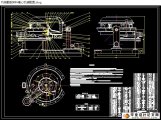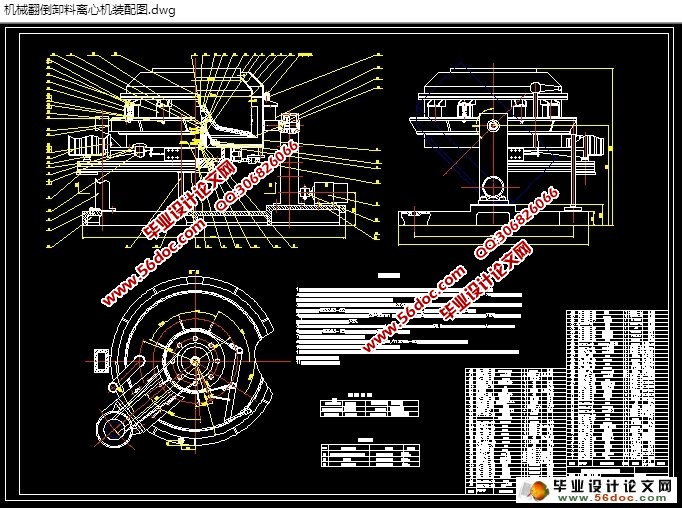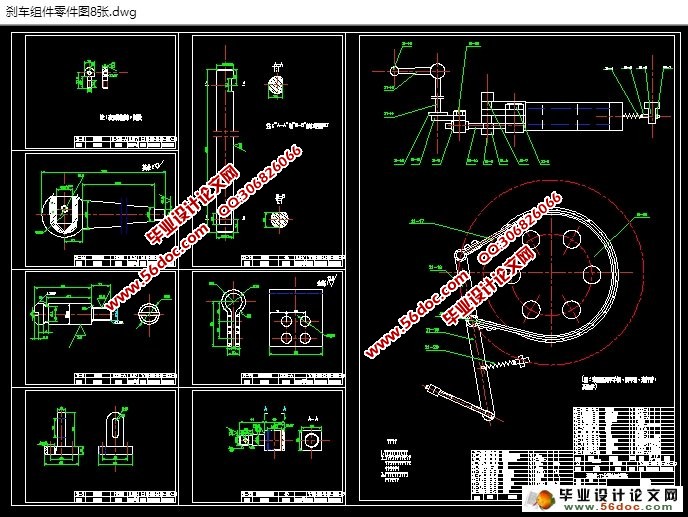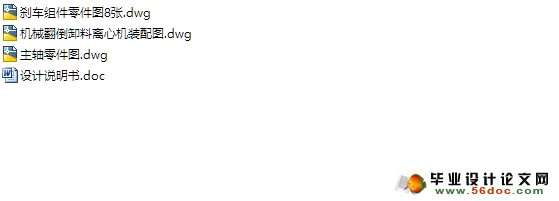机械翻倒卸料离心机设计(含CAD零件装配图)(任务书,设计说明书13700字,CAD图纸10张)
摘要
离心机是利用离心力,分离液体与固体颗粒或液体与液体的混合物中各组分的机械。离心机主要用于将悬浮液中的固体颗粒与液体分开;或将乳浊液中两种密度不同,又互不相溶的液体分开(例如从牛奶中分离出奶油);它也可用于排除湿固体中的液体,例如用洗衣机甩干湿衣服;特殊的超速管式分离机还可分离不同密度的气体混合物;利用不同密度或粒度的固体颗粒在液体中沉降速度不同的特点,有的沉降离心机还可对固体颗粒按密度或粒度进行分级。
离心机的主要特点,一是使用范围广泛,二是材料的适用性更强;三是产品规格多样。离心后处理设备,工艺流程直接关系到最终的质量。离心机与其他分离机械相比,不仅可以得到低水分含量的固相,液相纯度高,而且节省劳动力,减轻劳动强度,改善工作条件,和连续操作,自动控制、安全可靠的操作,占地面积小等。因此,自1836年以来,前三足离心机用于工业在德国,到目前为止超过一百年,取得了巨大的发展。各种类型的离心机,许多品种各有特色。是用来提高技术参数、系列化、自动化方向,和鼓的组合结构增加使得有越来越多的特殊品种。
现在,离心机广泛应用于化工、炼油、轻工、医药、食品、纺织、冶金、煤炭、矿产加工、运输、环保、军工等各部门。如湿煤煤粉复苏;石油钻井和泥浆净化;铀同位素浓缩;污水处理污泥浓度和脱水;石油和化工产品的细化;提取抗生素、杀虫剂、牛奶、酵母、啤酒、果汁、糖、橙油、动植物油、米糠油、淀粉等食品制造;纤维脱水;润滑油、燃油净化等等都需要使用离心机。离心机是为国民经济的飞速发展成为广泛使用的一种通用机械。
毕业设计题目是Φ800机械翻倒离心机的设计。进行了转鼓壁的厚度计算,拦液板的计算,转鼓底的设计,功率计算和电动机的选择,传动皮带的设计及选择,主轴的设计和强度校核,轴承的选择,翻到架的设计和强度计算,刹车的结构设计和强度计算,翻倒传动部分的设计计算,和其它的一些设计计算。
在设计中,首先要了解到离心机的工作原理:先由控制电路接通带动转鼓转动的电动机,通过皮带的传动使转鼓转动,转鼓转动使物料固液分离,液体通过离心机底部的排液管流出,固体留在转鼓壁上,然后再由控制电路接通翻倒电动机使离心机翻转倒出固体,这样就完成了分离的整个过程,这也是我们设计必须明白的。然后使了解离心机的各个零部件的构造和它们的材料工艺要求。最后对离心机进行整体的评定。
关键词: 离心机; 转鼓壁; 转鼓底; 主轴;
Abstract
Centrifuge is the use of centrifugal force, the mechanical components of the mixture of liquid and solid particles or liquid and liquid. Centrifuge is mainly used for separating solid particles and liquid suspension; or emulsion of two different densities, but also separation of miscibility liquids (e.g. from milk cream); it can also be used to remove moisture in solid liquid, such as washing machine off wet clothes; special speeding tubular separator can separate the gas mixture of different density; settlement velocity in liquids with different solid particles of different density or size, some settling centrifuge can also according to the density of solid particles or particle size classification. The main characteristics of the centrifuge is the use of a wide range of two is more applicable materials; three is the product specification variety.
Centrifugal post processing equipment, the process is directly related to the The end of the centrifuge quality. Compared with other mechanical separation, solid phase can not only get low moisture content, high purity liquid, and save labor, reduce labor intensity, improve working conditions, and continuous operation, automatic control, safe and reliable operation, small footprint. Therefore, since 1836, the first three foot centrifuge for the industry in Germany, so far more than one hundred years, has achieved great development. Various types of centrifuges, many varieties of different features. To improve the technical parameters, series, automatic direction, and the increase of the combination structure of drum special varieties are more and more.
Now, the centrifuge is widely used in chemical industry, oil refining, light industry, medicine, food, textile, metallurgy, coal, mineral processing, transportation, environmental protection, military and other departments. Such as wet coal recovery; oil drilling and mud purification; uranium isotope; sewage sludge Concentration and dehydration; the refinement of petroleum and chemical products; extraction of antibiotics, pesticides, milk, yeast, beer, fruit juice, sugar, orange oil, vegetable oil, rice bran oil, starch and other food manufacturing; fiber wanderings; lubricating oil and fuel oil purification and so on need to use centrifuge. Centrifuge is for the rapid development of the national economy become widely used a general machinery.
The graduation design topic is the phi Φ800 mechanical overturned centrifuge design.I have carried on the drum wall thickness calculation, calculation of liquid plate stopped, design of drum bottom, power calculation and motor, belt drive design and the selection of the, spindle design and strength check, bearing selection, turn to frame the design and strength calculation, structure design and strength calculation of the brake, overturned transmission part of the design and calculation, and the other some design calculation.
In the design, first I have to understand the working principle of centrifuge: first control circuit is connected to the drum is driven to rotate the motor, belt drive through the rotary drum to rotate, drum rotation causes the material to solid-liquid separation, liquid through the bottom of the centrifuge tube for discharging liquid outflow, remained in the solid walls of the basket, then by the control circuit is connected to the overturned motor enable centrifuge flip poured out solid, thus completing the separation of the whole process, this is our design must understand. Then to understand the structure of the various parts of the centrifuge and their material technology requirements at the end of the centrifuge is used for the overall evaluation.
Key words: Drum Wall; Centrifuges; Basket Bottom; Principal Axis;
原始数据
转鼓直径: 800mm
工作转速: 1200r/min
物料密度: 1.05 10 kg/m
最大加料量: 115kg
启动时间: 60 ~120s
固液比 : 1:1
设计专题: 主轴结构设计
目 录
原始数据 1
第一章绪论 2
1.1 离心机的概述 2
1.2 离心机的特点应用范围及材料的选择 3
1.2.1 主轴的材料 4
1.3 离心机的分离过程及分类 4
1.4 国外离心分离技术的进展 4
1.5 国内技术现状 6
第二章离心机转鼓的设计和强度计算 7
2.1 转鼓的设计分析 7
2.2 转鼓和主轴材料的选择 7
2.3 离心机转鼓的设计与校核 9
2.3.1 转鼓筒体壁厚计算 9
2.4 拦液板厚度的计算 11
2.4.1 拦液板的厚度按锥形转鼓计算 11
第三章质量,质心,转动惯量计算 14
3.1 加强箍的计算 14
3.2 拦液板的计算 14
3.3 转鼓筒体的计算 16
3.4 转鼓底的计算 17
第四章功率的计算与电机的选择 24
4.1 功率的计算 24
4.2 电机的选择 27
第五章三角带传动设计的计算 28
第六章主轴的设计和计算 31
6.1 主轴的结构设计 31
6.2 主轴的受力分析 31
6.3 主轴的强度计算 34
6.4 轴承的选择设计及寿命校核 34
第七章翻倒架的设计计算 35
7.1 质心位置的确定 35
7.2 翻倒架的设计计算 37
7.2.1 一些固定件的质量质心计算 37
7.2.2 翻倒架的强度计算 38
第八章右轴的结构设计与强度计算 40
8.1 右轴的设计 40
第九章键的校核 42
第十章刹车的结构设计与强度计算与总结 43
10.1 制动系统的选择 43
10.2 带式制动器的强度校核 43
10.3 总结 44
参考文献 45
致谢 47
|







